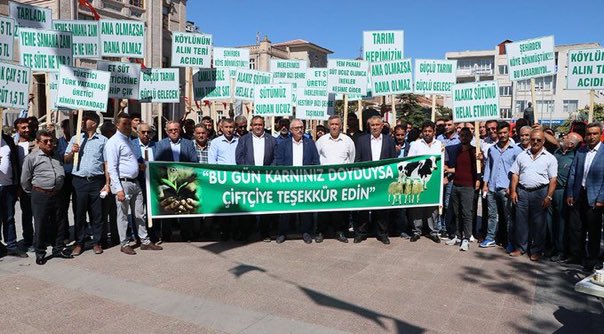Turkish farmers face an uncertain future due to the government’s announcement of the removal of critical subsidies for fuel, fertilizer and crop premiums starting in 2025, raising fears of widespread financial hardship across the agricultural sector.
The decision was revealed in the Official Gazette following the publication of a new agricultural support policy for the 2025-2027 period. The policy, issued under a presidential decree, will eliminate fuel and fertilizer subsidies as well as premium payments for 17 key crops. Farmers will receive these supports for the last time in 2024.
Ali Ekber Yıldırım, a prominent agricultural journalist, broke the news, noting that the cuts represent a significant blow to farmers already struggling with high production costs. “Farmers will no longer receive the vital fuel and fertilizer subsidies that have been a lifeline for many. This decision will hit the agricultural sector hard, with farmers receiving their last subsidies in 2024,” Yıldırım said in a post on X.
Under the new system, the government plans to introduce a base support payment of 244 Turkish lira per decare (approximately 0.25 acres) in 2025. However, the payment will be adjusted according to factors such as planned production and product development.
The announcement has sparked widespread concern among farmers and agricultural experts, who argue that the subsidy cuts could devastate Turkey’s agricultural sector, which is already grappling with soaring input costs and stagnating crop prices.
Concerns over land lease policy
In addition to the subsidy cuts, a new land lease policy has added to farmers’ anxieties. Agricultural lands that remain uncultivated for two consecutive years can be leased out by the Ministry of Agriculture and Forestry. This policy, introduced through an amendment to the Soil Conservation and Land Use Law, aims to make use of idle lands by leasing them to local farmers, cooperatives and other organizations.
However, farmers and experts fear that the policy may exacerbate existing issues rather than solve them. Critics argue that large corporations could exploit the policy, leading to small-scale farmers losing their land and livelihood.
“Big companies will lease the land, and eventually, they’ll take it away from the farmers. This policy will benefit large corporations, while small farmers will be pushed out,” the Gazete Duvar news website quoted İbrahim Kargın, a farmer from the Yenişehir district of Turkey’s western Bursa province, as saying.
Erkan Erdem, a representative from the Yenişehir Environmental Platform, echoed these concerns, calling the policy a violation of the constitutional right to own property. “Forcing farmers to lease their land if they can’t cultivate it is against the constitution. It puts small farmers at a disadvantage and increases their risk of losing their land,” he told Gazete Duvar.
The removal of subsidies and the introduction of the new land lease policy come at a time when Turkish farmers are already reeling from rising production costs. According to the Turkish Statistical Institute, agricultural input prices increased by 47.56 percent in June 2024 compared to the previous year. Despite this, crop prices have remained stagnant, and in some cases, have even declined, leaving farmers unable to cover their costs.
The financial strain has led to growing unrest among farmers nationwide, with protests erupting in several regions. Farmers have staged tractor convoys and public demonstrations, decrying the government’s policies and the economic conditions that have left them on the brink of financial ruin.
Agricultural experts warn that the government’s recent decisions could have long-term repercussions for Turkey’s food security and agricultural economy. With many farmers contemplating abandoning production altogether, the country could face significant disruptions in its food supply chain.
The Turkish government, however, has downplayed the protests, attributing them to political motivations by opposition parties. Meanwhile, opposition leaders argue that the protests are a direct response to the government’s failure to address the financial hardships faced by farmers.

